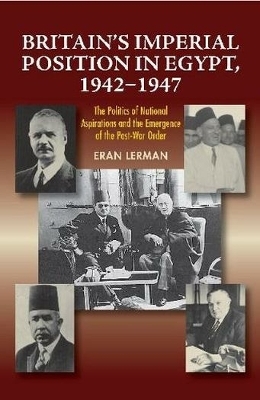
Britain's Imperial Position in Egypt, 1942-1947
The Politics of National Aspirations and the Emergence of the Post-War Order
Seiten
2021
Liverpool University Press (Verlag)
978-1-78976-135-1 (ISBN)
Liverpool University Press (Verlag)
978-1-78976-135-1 (ISBN)
In 1942, the British Empire won a great military victory – Al-’Alamayn, “the end of the beginning” – on Egyptian soil. But this came at the cost of “national aspirations” – al-Gala’ (evacuation of all British forces) and sovereignty over Sudan – being raised as the rallying cries of a frustrated political opposition.
In 1942, the British Empire won a great military victory – Al-’Alamayn, “the end of the beginning” – on Egyptian soil. Yet five years later, in an ugly, forgotten debate at the Security Council, the United States led Britain and Egypt to an inconclusive draw.
How did this Imperial weakening come about? The roots lie in the interaction of British policy, Egyptian politics, and the post-war international order. Imperial control had rested upon the practice of intervention – using the rivalry between the Palace and the majority political party, the Wafd. In 1942, and again in 1943 and 1944, British Ambassador Miles Lampson forced Faruq, the King of Egypt, to put, and keep, Prime Minister Mustaffa Nahhas in power. But this came at the cost of “national aspirations” – al-Gala’ (evacuation of all British forces) and sovereignty over Sudan – being raised as the rallying cries of a frustrated political opposition. Meanwhile, American (and Soviet) influence grew; and Egypt’s new diplomatic instrument, the Arab League, became part of the political game.
Nahhas was dismissed in September 1944. His successor, Ahmad Mahir, who had been on the Embassy’s payroll, was assassinated in 1945. Lampson thus lost control of the game. In London, Foreign Secretary Ernest Bevin recognized the need for a new ambassador and a conciliatory negotiator (Lord Stansgate), offering full evacuation to Prime Minister Ismail Sidqi. And yet this compromise also broke down as a result of the unresolved Sudan question. Intervention was weighed in London, but rejected. The Egyptians insisted on the 1947 UN debate, which merely produced a prolonged stalemate indicating Britain’s Imperial decline. This set the stage for the Suez debacle of the 1950s, calling an end to Britain's authority at multiple levels.
In 1942, the British Empire won a great military victory – Al-’Alamayn, “the end of the beginning” – on Egyptian soil. Yet five years later, in an ugly, forgotten debate at the Security Council, the United States led Britain and Egypt to an inconclusive draw.
How did this Imperial weakening come about? The roots lie in the interaction of British policy, Egyptian politics, and the post-war international order. Imperial control had rested upon the practice of intervention – using the rivalry between the Palace and the majority political party, the Wafd. In 1942, and again in 1943 and 1944, British Ambassador Miles Lampson forced Faruq, the King of Egypt, to put, and keep, Prime Minister Mustaffa Nahhas in power. But this came at the cost of “national aspirations” – al-Gala’ (evacuation of all British forces) and sovereignty over Sudan – being raised as the rallying cries of a frustrated political opposition. Meanwhile, American (and Soviet) influence grew; and Egypt’s new diplomatic instrument, the Arab League, became part of the political game.
Nahhas was dismissed in September 1944. His successor, Ahmad Mahir, who had been on the Embassy’s payroll, was assassinated in 1945. Lampson thus lost control of the game. In London, Foreign Secretary Ernest Bevin recognized the need for a new ambassador and a conciliatory negotiator (Lord Stansgate), offering full evacuation to Prime Minister Ismail Sidqi. And yet this compromise also broke down as a result of the unresolved Sudan question. Intervention was weighed in London, but rejected. The Egyptians insisted on the 1947 UN debate, which merely produced a prolonged stalemate indicating Britain’s Imperial decline. This set the stage for the Suez debacle of the 1950s, calling an end to Britain's authority at multiple levels.
Dr. Eran Lerman is a lecturer at Shalem College, Jersusalem, and Vice President of the Jerusalem Institute for Strategy and Security. He served as Israels Deputy National Security Advisor (20062015) and prior as Director for the American Jewish Committees Israel and Middle East Office. A long-serving military intelligence officer, he holds a PH.D. from the London School of Economics and a Masters from Harvard University. He has long served as an analyst and commentator on regional and international affairs.
| Erscheinungsdatum | 04.11.2021 |
|---|---|
| Verlagsort | Liverpool |
| Sprache | englisch |
| Maße | 156 x 234 mm |
| Gewicht | 688 g |
| Themenwelt | Geisteswissenschaften ► Geschichte ► Regional- / Ländergeschichte |
| Geschichte ► Teilgebiete der Geschichte ► Wirtschaftsgeschichte | |
| ISBN-10 | 1-78976-135-2 / 1789761352 |
| ISBN-13 | 978-1-78976-135-1 / 9781789761351 |
| Zustand | Neuware |
| Haben Sie eine Frage zum Produkt? |
Mehr entdecken
aus dem Bereich
aus dem Bereich
die Ukraine, Polen und der Irrweg in der russischen Geschichte
Buch | Hardcover (2023)
C.H.Beck (Verlag)
28,00 €
wie die USA und China um die technologische Vorherrschaft auf der …
Buch | Hardcover (2023)
Rowohlt (Verlag)
30,00 €


